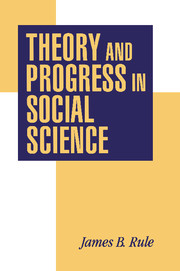2 - The reckoning of progress
Published online by Cambridge University Press: 05 November 2011
Summary
The criterion for theoretical progress developed above is clearly a pragmatic one, having to do with the ability of different forms of understanding to support efforts at coping with practical dilemmas of social living. This is far from being a consensus view. Proponents of alternate views would argue that each theory generates its own criteria of success, and that such criteria need have nothing to do with what I have termed coping. In this light, the analytical accomplishements of any theoretical program, and certainly any “progress” achieved by it, can only be judged in terms defined by the theory itself. The implications of such views for the study of progress – indeed, for the idea of progress – are far-reaching.
This chapter seeks to explore some of these implications. The main focus is the sociological study of science. Proponents of the two main currents in this subdiscipline, the Mertonians and the constructivists, have put forward what most would see as quite opposing views of progress. Yet I argue that, for some purposes, these two views actually converge in a kind of shared antipathy to a conception like the one embraced in this book.
What sense do such different views make of theoretical change in social science? To address this question, I consider the life cycles of ethnomethodology and Balesian small-group studies – two theoretical projects whose meteoric rise and dramatic decline hold special interest.
Information
- Type
- Chapter
- Information
- Theory and Progress in Social Science , pp. 49 - 74Publisher: Cambridge University PressPrint publication year: 1997
